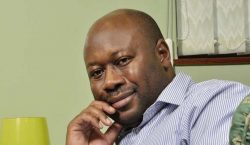

HSBC’s global business took a beating last quarter, and the London-based bank is warning of more pain ahead as it undertakes a major restructuring that will likely entail more job cuts.
HSBC pulled in pre-tax profit of US$4,8 billion for the three months ended in September, a drop of 18 percent compared to the same period last year, the bank said in an earnings report on Monday. Revenue fell 3 percent to US$13,4 billion and HSBC abandoned a key profitability goal for next year.
The bank blamed “challenging market conditions” and “ongoing economic uncertainty” for a slump in its European and American business units, which it now plans to shrink.
Previous plans to turn those businesses around are no longer sufficient given the softer revenue outlook and “more urgent” action is needed, HSBC interim CEO Noel Quinn said Monday on a call with analysts.
“We need to accelerate plans to remodel these parts of our business portfolio,” said Quinn, who was presenting his first quarterly results update since taking over in August. The bank warned that the restructuring could take a couple of years to complete.
HSBC and other major banks face a growing list of negative headwinds, including falling interest rates, which make it harder to generate profit on loans and mortgages, and geopolitical uncertainty in top markets.

The lender announced in August that it would reduce its headcount by up to 2 percent, or roughly 4 700 positions. The move came as HSBC’s CEO John Flint stepped down after less than two years on the job. Earlier this month, the Financial Times reported that HSBC was planning to cut up to 10 000 additional jobs, or more than 4 percent of its workforce. HSBC declined to comment on that figure, but signaled there would be cuts.
“There will have to be some cost measures [taken] to compensate for declining revenue,” Quinn told media on a separate call. Job cuts could also come from support functions at a group level, he said.
When asked about cuts, Quinn said the bank has not yet started a consultative process with potentially affected staff.
The bank also flagged the possibility of “significant” charges in the fourth quarter and beyond, including additional restructuring charges. Capital would be redirected towards higher growth, higher return markets, such as Asia, the Middle East, Canada and Latin America, Quinn told journalists.
The “good news” is that the poor performance “looks set to finally goad the management into taking some of the actions to address underperforming businesses that we have been waiting for,” analysts at Keefe, Bruyette & Woods said in a research note.
Hong Kong was a bright spot.
HSBC said performance in the financial hub was “resilient,” a noteworthy result given the political unrest and protests that have rocked the city for five months. HSBC reported pre-tax profit in Asia rose 4 percent in the third quarter, to US$4,7 billion, representing the overwhelming majority of its earnings for the quarter.
Hong Kong would be an “obvious contender” for continued investment, Quinn said.
“Hong Kong had a very resilient performance in the first nine months of this year, particularly in [the third quarter].”
A number of HSBC’s very wealthy clients had put contingency plans in place by opening bank accounts elsewhere in the world, but there had been very little movement of funds into those accounts, Quinn said.
— CNN